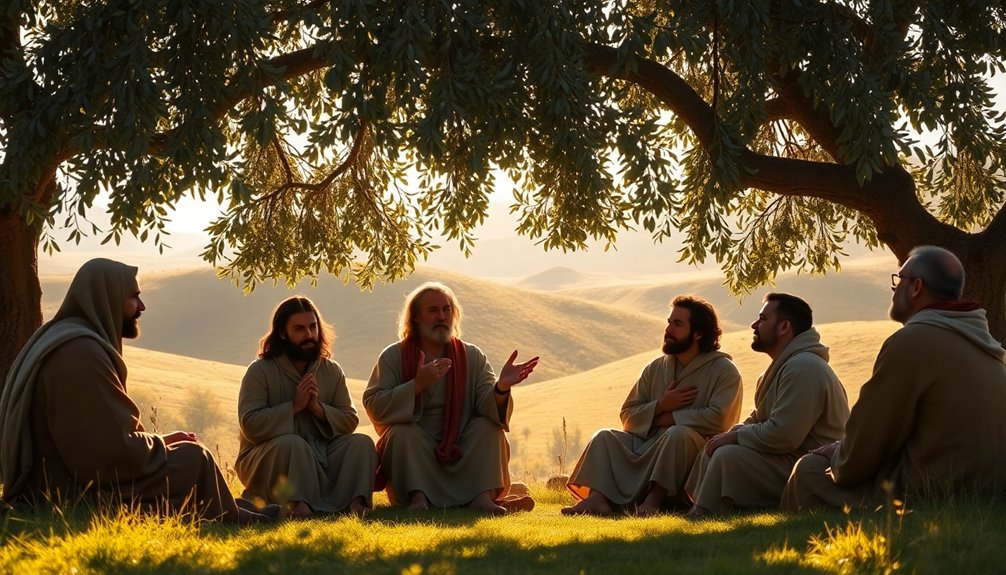The twelve disciples of Jesus were a diverse group, including fishermen and a tax collector, selected to spread his teachings. They witnessed many miracles and significant events, forming the backbone of early Christian communities. Each disciple brought unique backgrounds and skills, showing that anyone can respond to Jesus' call. Their experiences exemplify faith, sacrifice, and the importance of community. Discipleship isn't just about understanding; it's a gradual journey of commitment and growth. If you're curious about the specific roles and stories of these apostles, there's much more to uncover.
Key Takeaways
- Jesus selected twelve apostles from diverse backgrounds, including fishermen and a tax collector, reflecting inclusivity in discipleship.
- The apostles were empowered to witness Jesus' miracles and teachings, shaping the foundation of the early Church.
- The Great Commission highlights their mission to spread the message of love and service beyond their immediate communities.
- Discipleship involves a gradual process of growth, exemplified by apostles like Peter, showcasing the journey of faith.
- The apostles faced persecution and challenges, inspiring modern Christians to embrace a life of commitment to their faith.
Introduction

In the realm of early Christianity, Jesus handpicked twelve disciples, known as apostles, to share his teachings and lay the groundwork for the Church.
These apostles weren't just any followers; they came from diverse backgrounds, including fishermen, a tax collector, and individuals from various social strata. By choosing such a varied group, Jesus showed that his message was for everyone, regardless of their past or profession.
Throughout his ministry, the apostles played pivotal roles, witnessing Jesus' miracles and participating in significant events that shaped the early Christian Church.
They absorbed his teachings, learned about love and forgiveness, and prepared to spread this message to the world. After Jesus' resurrection, they received the Great Commission, a vital directive to preach the Gospel to all nations.
However, not all was harmonious among the apostles. Judas Iscariot, one of the twelve, is infamous for betraying Jesus, leading to his arrest and crucifixion.
This act of betrayal serves as a reminder of the complexities within the group. The legacy of these apostles remains foundational to the teachings and structure of the Church today.
Scriptural Basis for Discipleship

When you look at the Scriptures, you'll see that discipleship is rooted deeply in Jesus' teachings.
Key passages like Matthew 4:19 and the Great Commission in Matthew 28:19–20 highlight the call to follow and spread the Gospel.
Let's explore these primary and secondary references that illustrate what it means to be a disciple.
Primary Bible References
Throughout the New Testament, several key passages provide a scriptural foundation for understanding discipleship. The Twelve Apostles, including Peter, James, John, and Matthew, were handpicked by Jesus to spread His message. In the Gospel of Matthew, we see Jesus instructing His disciples in Matthew 10:2-4, highlighting their unique roles in His ministry.
The Great Commission, found in Matthew 28:19-20, underscores Jesus' command to make disciples of all nations, emphasizing the importance of baptizing and teaching others to follow His commandments.
Moreover, in John 13:34-35, Jesus sets a crucial standard for His followers by commanding them to love one another, establishing this love as the hallmark of discipleship.
The Synoptic Gospels further illustrate the active role of the apostles, as they're sent out in pairs to preach, heal, and perform miracles, as detailed in Mark 6:7-13.
Finally, Acts 1:15-26 recounts the appointment of Matthias, ensuring the Twelve Apostles' leadership structure remained intact in the early Church.
Together, these passages form a robust scriptural basis for understanding what it means to be a disciple of Jesus.
Secondary Bible References
Discipleship, as portrayed in the New Testament, is deeply rooted in Jesus' teachings and actions, providing a clear framework for what it means to follow Him. Central to this framework is the Great Commission in Matthew 28:19-20, where Jesus commands His followers to make disciples of all nations.
This call to discipleship requires you to deny yourself and take up your cross daily, as stated in Luke 9:23. In John 15:8, Jesus emphasizes that true discipleship is evident when you bear fruit, glorifying the Father.
The calling of the first disciples in Mark 1:16-20 shows the immediate response needed when you decide to follow Jesus—just like Simon Peter and Andrew, who left their fishing nets without hesitation.
The early Church, as described in Acts 2:42, demonstrates the essence of communal discipleship, where believers committed themselves to the apostles' teaching, fellowship, breaking of bread, and prayers.
This commitment laid the groundwork for a vibrant community of faith, encouraging you to engage in discipleship alongside others, fostering growth and transformation as you strive to follow Jesus.
Jewish Society in First Century

The Jewish society in the first century was a complex tapestry woven from agrarian livelihoods, varied social classes, and intense religious devotion. Most people lived off the land, farming and fishing in regions like Galilee and Judea.
You'd notice the distinct classes: the wealthy elite enjoyed comforts, while middle-class artisans and merchants worked hard to make a living, and many impoverished families struggled for basic necessities.
Religious life was central to identity, with groups like the Pharisees and Sadducees interpreting Jewish law in different ways. The Pharisees focused on oral traditions, while the Sadducees held power in the Temple, prioritizing the written law.
Amid the Roman occupation, tensions simmered between local populations and their rulers, fueling a longing for political and religious autonomy.
The Temple in Jerusalem stood as the focal point of worship and sacrifice, symbolizing both national identity and spiritual life. It was a significant unifying force for the Jewish community until its destruction in 70 AD, which marked a pivotal moment in Jewish history.
Understanding this society helps you grasp the context in which Jesus and his disciples operated.
Cultural Context of Discipleship

In first-century Judea and Galilee, the cultural context of discipleship was deeply intertwined with the socio-political landscape of the time. The disciples called by Jesus were primarily Jewish men from varied backgrounds, such as fishermen and a tax collector, reflecting the socio-economic spectrum of their society. Their teachings and missions were significantly influenced by the Roman occupation and the existing Jewish religious landscape.
As they navigated cultural tensions between Jews and Gentiles, the disciples actively engaged in community building, addressing the needs of marginalized individuals. Jesus emphasized themes of love, compassion, and the Kingdom of God in his teachings, which shaped their approach to outreach.
The Great Commission, given to the disciples after Jesus' resurrection, highlighted their mission to spread his teachings beyond their immediate community, promoting a sense of inclusivity and outreach.
This cultural context demanded that the disciples not only learn from Jesus but also embody his principles in their daily lives. By fostering connections across diverse groups, they laid the foundation for a movement that transcended boundaries, inviting all into the transformative experience of faith and community.
Discipleship Requires Complete Commitment

When you think about discipleship, it's easy to fall for common misconceptions that downplay its demands.
The truth is, following Jesus requires a level of commitment that can feel overwhelming at times.
If you're ready to embrace this journey, you'll need to acknowledge the sacrifices and challenges that come with it.
Debunk Common Discipleship Misconceptions
Many people mistakenly believe that true discipleship demands complete commitment from the start, but this isn't the case. The journey of discipleship is a gradual process of learning and growth.
Look at the apostles: they didn't immediately grasp everything Jesus taught. For instance, Peter went from denying Christ to becoming a leader of the early church, illustrating that faith develops over time.
The Gospels show us that many apostles, like James and John, were called from their everyday professions and had imperfect faith. This highlights that discipleship isn't about flawless devotion but about embracing a journey filled with challenges and growth.
The Great Commission in Matthew 28:19-20 emphasizes that Jesus entrusted His disciples with the mission to spread the Gospel, showcasing their evolving roles rather than requiring absolute commitment upfront.
Furthermore, the diverse backgrounds of the apostles—from Matthew the tax collector to Peter the fisherman—demonstrate that discipleship doesn't follow a singular path.
It embraces a variety of experiences and levels of commitment, debunking the misconception that you need to have everything figured out before following Christ. Discipleship is about starting where you're and growing in faith.
Discipleship Is Too Demanding
Discipleship often feels like a steep mountain to climb, demanding a level of commitment that can be intimidating. Jesus called you to take up your cross and follow him, highlighting the necessity of self-denial and sacrifice (Mark 8:34).
Just like the apostles, who left their fishing nets behind to pursue this mission, you may find yourself challenged to abandon familiar comforts for a greater purpose (Matthew 4:19-20).
Jesus made it clear that your relationship with him must come before all else, even family (Luke 14:26). This kind of commitment requires you to count the cost and be prepared to endure hardship, as illustrated in the parable of the builder (Luke 14:28-30).
The early disciples faced persecution and even martyrdom; their unwavering commitment to Christ serves as a powerful testament to what discipleship demands.
Being a disciple means embracing the reality that the path may be fraught with difficulties. Yet, it's in this commitment that you'll find true purpose and fulfillment, echoing the sacrifices made by those who followed Jesus.
Are you ready to climb that mountain?
Daily Prayer Practices

As you explore daily prayer practices, consider how daily scripture reflection and group Bible study sessions can enhance your spiritual journey.
These practices not only deepen your understanding of God's word but also foster a sense of community among believers.
Engaging in these activities regularly can strengthen your connection to prayer and the teachings of Jesus.
Daily Scripture Reflection
Incorporating daily scripture reflection into your routine can transform your spiritual journey by deepening your understanding of Jesus' teachings and the lives of His disciples. This practice encourages you to meditate on specific Bible passages, allowing you to connect with the commitments required in discipleship. As you engage with the lives of the apostles, you'll find inspiration to reflect on your own faith journey.
Integrating prayer practices alongside daily scripture reflection fosters a personal connection with God, mirroring the relational dynamics observed among Jesus and His disciples. Consider using resources like Bible study guides and devotionals to enhance your understanding. These tools provide context and insights into the historical and cultural backgrounds of the scriptures, enriching your reflection.
Setting aside specific times each day for scripture reading and prayer helps cultivate a routine that honors the devotion of Jesus' disciples. By making daily scripture reflection a priority, you'll not only gain deeper insights but also become a more effective teacher of the gospel, sharing the transformative power of God's word with others.
Embrace these spiritual practices, and watch your faith flourish.
Group Bible Study Sessions
Group Bible study sessions offer a powerful way to deepen your prayer practices and strengthen your connection to God. By gathering with fellow disciples, you create an environment of communal prayer that fosters unity and shared faith. Just as the apostles emphasized the importance of praying together, you can build on their example by making prayer a central part of your study sessions.
In these gatherings, you can incorporate key elements of prayer, such as thanksgiving and intercession. Consider taking turns praying for each other's needs, reflecting the early Christians' commitment to support one another.
Remember, the Lord's Prayer serves as a foundational model, reminding you to focus on worship, dependence on God, and forgiveness in your prayers.
As you delve into Scripture, encourage one another to seek guidance from God, just like Jesus urged his disciples to pray in the Garden of Gethsemane.
Through regular group sessions, you'll cultivate a richer prayer life that mirrors the practices of the early church, nurturing a deeper relationship with God and reinforcing your commitment to living as His disciples. Embrace this opportunity and watch your spiritual journey flourish.
Final Thoughts on Discipleship

Discipleship isn't just a historical concept; it's a vibrant call to action that resonates through the ages. When you embrace discipleship, you're stepping into a mission that's as relevant today as it was for the twelve disciples chosen by Jesus. Their diverse backgrounds and professions highlight that anyone can contribute to the Gospel, emphasizing that your unique gifts are vital in building Christian communities.
Through a close personal relationship with Jesus, the disciples witnessed significant events that shaped their commitment to His teachings. The Great Commission serves as a powerful reminder of your role in spreading the message of love and service. Just as the disciples were tasked with baptizing and teaching all nations, you too are called to share the Gospel within your own community.
The legacy of the disciples continues to influence modern Christianity, inspiring you to live a life of faith and dedication. Their sacrifices illustrate the importance of commitment to the mission of Christ.
Additional Resources

Exploring the teachings and impact of the twelve disciples can be greatly enhanced by utilizing a variety of resources available today. The New Testament serves as a foundational text, with key insights found in the Gospel of Matthew and Acts of the Apostles. These works detail the roles and missions of the apostles and prophets, providing a clearer understanding of their teachings.
To dive deeper, consider engaging with interactive study opportunities such as BibleMesh mini-courses or the Cerego app. These platforms offer engaging content that helps you grasp complex concepts related to the disciples.
Online forums and additional readings on early church history can also enrich your understanding, allowing you to see how the diverse backgrounds of the disciples influenced their contributions to Christian churches.
Don't forget the significance of the Apostles' Creed, a historical document that connects the teachings of the early disciples to contemporary Christian beliefs.
Frequently Asked Questions
What Are the Names of the 12 Disciples of Jesus?
When you think about influential groups in history, you might wonder about key figures. There are twelve notable individuals often discussed, including Simon Peter, Andrew, James (the son of Zebedee), John, Philip, Bartholomew, Matthew, Thomas, another James (the son of Alphaeus), Thaddaeus, Simon the Zealot, and Judas Iscariot.
Each one played a significant role in shaping the narrative that followed, leaving a lasting impact on various teachings and traditions.
Who Were the 12 Disciples in Order of Calling?
When you think about the order of calling, it starts with Simon Peter, followed by his brother Andrew.
Next, you have James and John, who immediately joined.
Then comes Philip, who brings Nathanael along.
After that, you meet Matthew, the tax collector.
Finally, you find Judas Iscariot and Simon the Zealot.
Each of these individuals had unique backgrounds and stories, but they all answered the call to follow.
Who Was the 13TH Disciple of Jesus?
The term "thirteenth disciple" typically refers to Matthias.
After Judas Iscariot's betrayal and death, the remaining apostles needed a replacement to maintain their number. They chose Matthias by casting lots, highlighting their commitment to leadership continuity.
Though he wasn't one of the original Twelve, Matthias played a significant role in spreading the Gospel. His legacy emphasizes the importance of establishing apostolic authority and supporting the early Church's mission.
Who Were the 12 Disciples and What Were Their Jobs?
The twelve disciples were a diverse group with various jobs.
You'd Simon Peter, Andrew, James, and John as fishermen, sharing a common trade.
Matthew stood out as a tax collector, often seen unfavorably by others.
The remaining disciples included Thomas, Thaddeus, and Simon the Zealot, among others.
Their different backgrounds highlight how people from all walks of life can come together for a common purpose, enriching the group's dynamic and mission.










